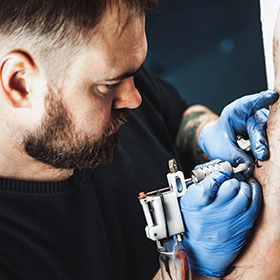Yes, Jergens Ultra Healing can be good for tattoos. It provides deep moisture and helps with skin repair, which is crucial for tattoo care.
But, is it the best option for your new ink? Taking care of a fresh tattoo is essential for its healing and appearance. Many people search for the right lotion to keep their tattoo vibrant and healthy. Jergens Ultra Healing is a popular choice for overall skin care, known for its moisturizing benefits.
But how does it fare when it comes to tattoos? In this post, we will explore its ingredients, benefits, and how it compares to other tattoo aftercare products. Stay with us to find out if Jergens Ultra Healing is the right fit for your tattoo care routine.
Introduction To Jergens Ultra Healing
Jergens Ultra Healing is a popular lotion. It helps with very dry skin. The lotion contains vitamins C, E, and B5. These vitamins are good for skin health. The lotion absorbs quickly. It does not leave a greasy feel.
Many people use Jergens Ultra Healing daily. It helps with dry hands and feet. Some use it on elbows and knees. It is also good for very dry patches. The lotion is gentle enough for sensitive skin. It is often used after a shower or bath. This helps lock in moisture. Some even use it on tattoos to keep the skin hydrated.
Tattoo Aftercare Essentials
Moisturization is key for healing tattoos. Dry skin can cause tattoos to crack. Cracks can lead to infections. Using a good moisturizer keeps the skin soft. Soft skin heals faster. Moisturizers like Jergens Ultra Healing are popular. They are effective for dry skin. It is important to apply it gently. Too much rubbing can harm the tattoo.
The healing process is delicate. It takes time and care. The skin needs to breathe. Covering the tattoo can trap moisture. This can cause problems. Keeping the area clean is very important. Avoid direct sunlight on the tattoo. Sun can fade the colors. Do not scratch or pick at the tattoo. It can damage the design. Follow these steps for a smooth healing process.
Ingredients In Jergens Ultra Healing
This lotion has many beneficial ingredients that help skin heal. It contains vitamins C, E, and B5. These vitamins are good for nourishing the skin. Glycerin is included too. This helps keep the skin moisturized. Shea butter is another important part. It makes the skin feel soft and smooth. All these components work together to keep your skin healthy.
Some ingredients might cause irritation. It contains fragrances, which can cause reactions for sensitive skin. Some people might react to alcohol in it. Methylparaben and propylparaben are also included. These can be irritants for some individuals. Always test on a small area first. This helps to make sure it is safe for your skin.
Benefits For Tattooed Skin
Tattoos need proper hydration. Jergens Ultra Healing helps keep the skin moisturized. This cream contains ingredients that lock in moisture. It helps to avoid dryness. Dry skin can make tattoos look dull. Hydrated skin makes tattoos look more vibrant and fresh. This lotion is non-greasy and absorbs quickly.
Jergens Ultra Healing has skin repair properties. It contains vitamins C, E, and B5. These vitamins help repair and strengthen the skin. Tattoos can cause skin damage. Using this lotion can help heal the skin faster. It also helps to reduce itching and redness. The cream supports the skin’s natural barrier. This helps to protect the tattoo.
User Experiences And Reviews
Jergens Ultra Healing is often praised for keeping tattooed skin hydrated. Many users report it helps maintain tattoo vibrancy. Ideal for daily use.
Positive Feedback
Many users love Jergens Ultra Healing for their tattoos. It helps keep the skin soft and moisturized. People say it soothes their tattoos. Some mention quick healing times. The lotion is easy to apply. It absorbs well without leaving a greasy feel. Users appreciate the gentle formula. It doesn’t irritate the skin. Many recommend it to others.
Negative Feedback
Some users had issues with Jergens Ultra Healing. Few say it caused redness. Others mention a burning sensation. Some people found it too thick. They had trouble spreading it. A few users experienced slow healing. Others prefer a different lotion. They feel it didn’t work for them. Some dislike the scent. It is too strong for their taste.
Expert Opinions On Jergens Ultra Healing
Dermatologists agree that Jergens Ultra Healing is safe for tattoos. Its hydrating formula helps keep the skin moisturized. This is crucial for tattoo healing. Dry skin can damage a new tattoo. Dermatologists recommend using a small amount. Apply gently on the tattoo. Always follow care instructions from your tattoo artist.
Many tattoo artists suggest Jergens Ultra Healing for aftercare. It helps in keeping the skin soft. This lotion also reduces flaking. Use it sparingly. Overuse can cause issues. Always ensure the tattoo is clean before applying. Consistency is key for good results. Tattoo artists stress the importance of following a proper aftercare routine.
Comparing Alternatives
Jergens Ultra Healing is often compared to other tattoo aftercare products. Its moisturizing properties can help keep tattoos hydrated and healthy. Some users report positive results, but it’s always best to consult with a tattoo artist.
Other Tattoo Aftercare Products
There are many tattoo aftercare products available. Each has its own pros and cons. Here is a comparison of a few popular options:
| Product | Pros | Cons |
|---|---|---|
| Aquaphor | Moisturizes well, easy to find, affordable | Can be too greasy, might clog pores |
| Hustle Butter | Natural ingredients, soothes skin, smells good | Expensive, not always available in stores |
| Tattoo Goo | Specially made for tattoos, reduces itching | Can dry out quickly, some people dislike the scent |
Each product has its unique benefits. Choosing the right one depends on personal preference and skin type.
Final Verdict
Jergens Ultra Healing is a popular lotion. Many people use it for dry skin. It helps to keep skin hydrated. Some users apply it on tattoos. They say it makes tattoos look fresh. It contains vitamins C, E, and B5. These vitamins help the skin heal. The lotion is thick and not greasy. It absorbs well into the skin.
Using Jergens Ultra Healing on tattoos can be good. It keeps the tattoo moist. This helps the healing process. Always test a small area first. Everyone’s skin is different. Some may have allergies. If you see redness, stop using it. For best results, follow your tattoo artist’s care advice.
Conclusion
Jergens Ultra Healing can be good for tattoos. It helps keep the skin moisturized and reduces dryness. Proper care is crucial for tattoo healing. Always consult your tattoo artist for advice on aftercare products. Jergens Ultra Healing provides a gentle option for tattoo maintenance.
But, always perform a patch test first. Healthy skin leads to vibrant tattoos. Make sure your tattoo gets the best care.

